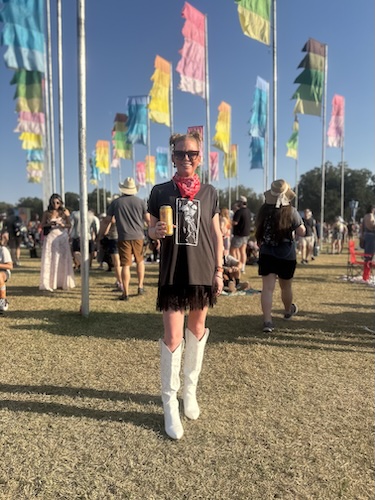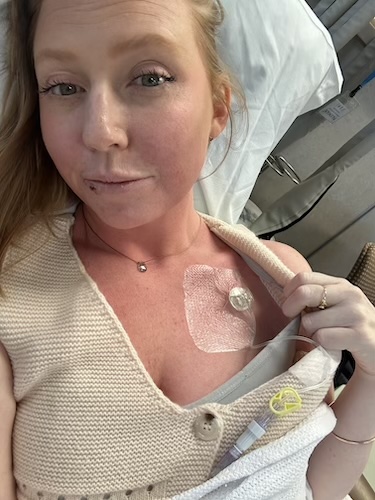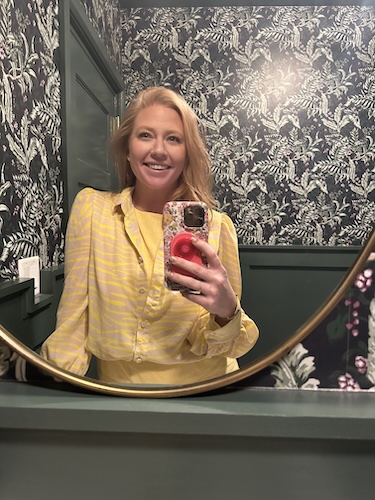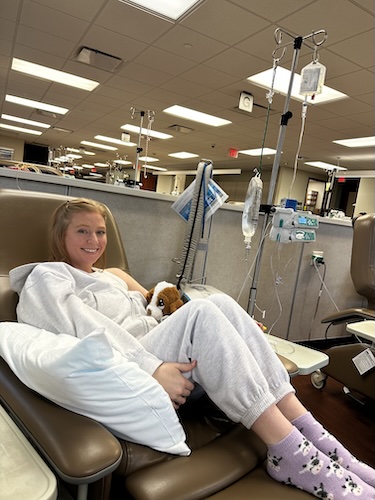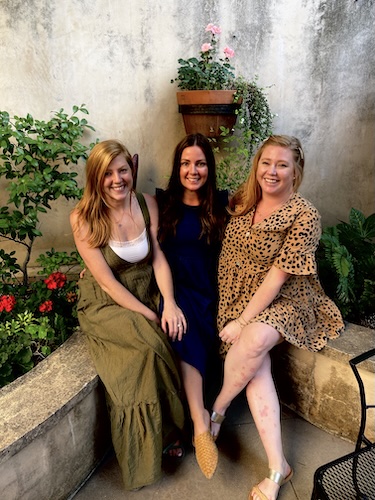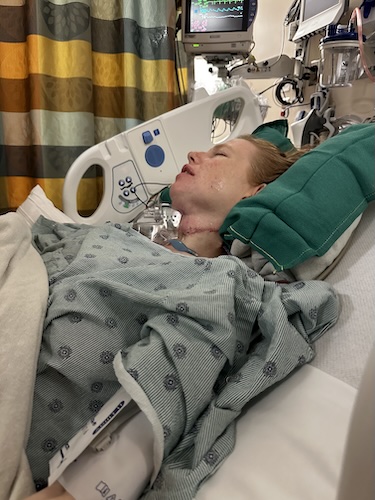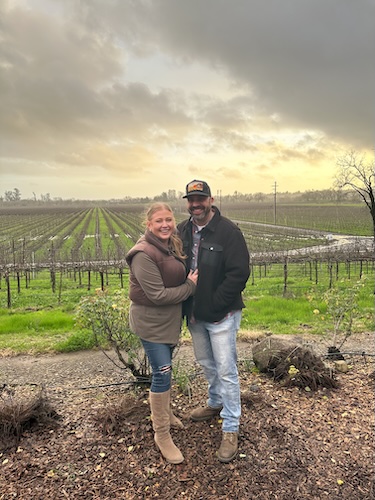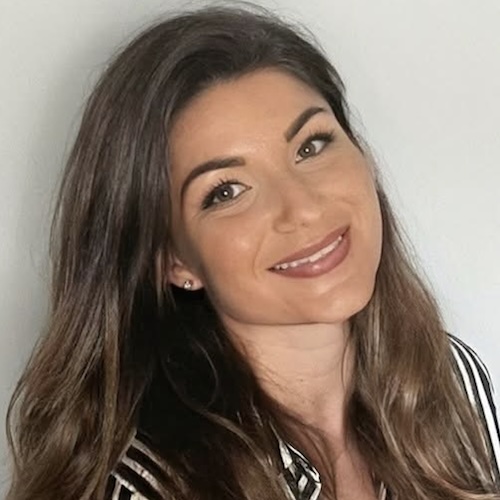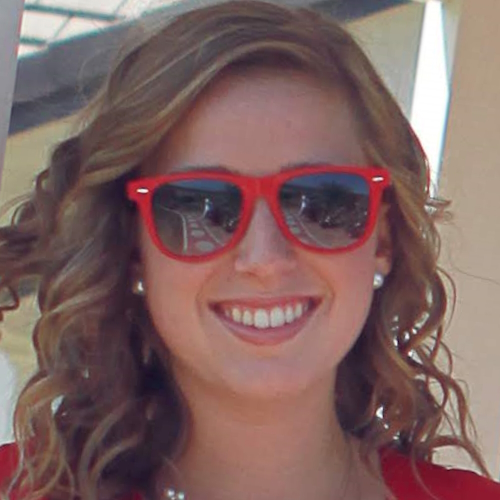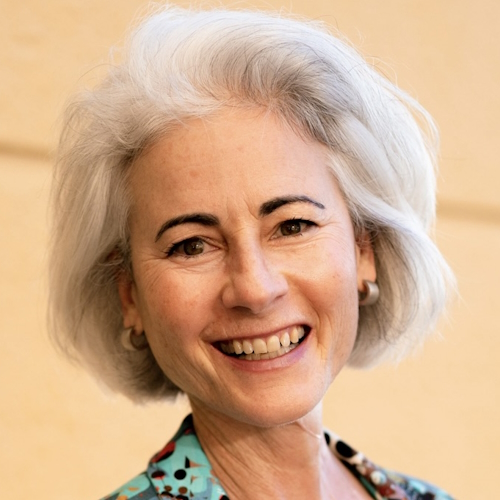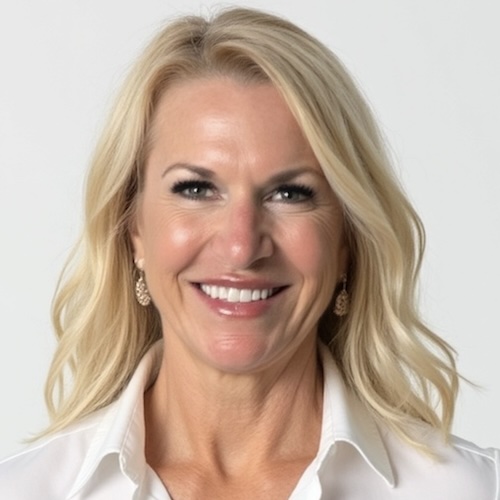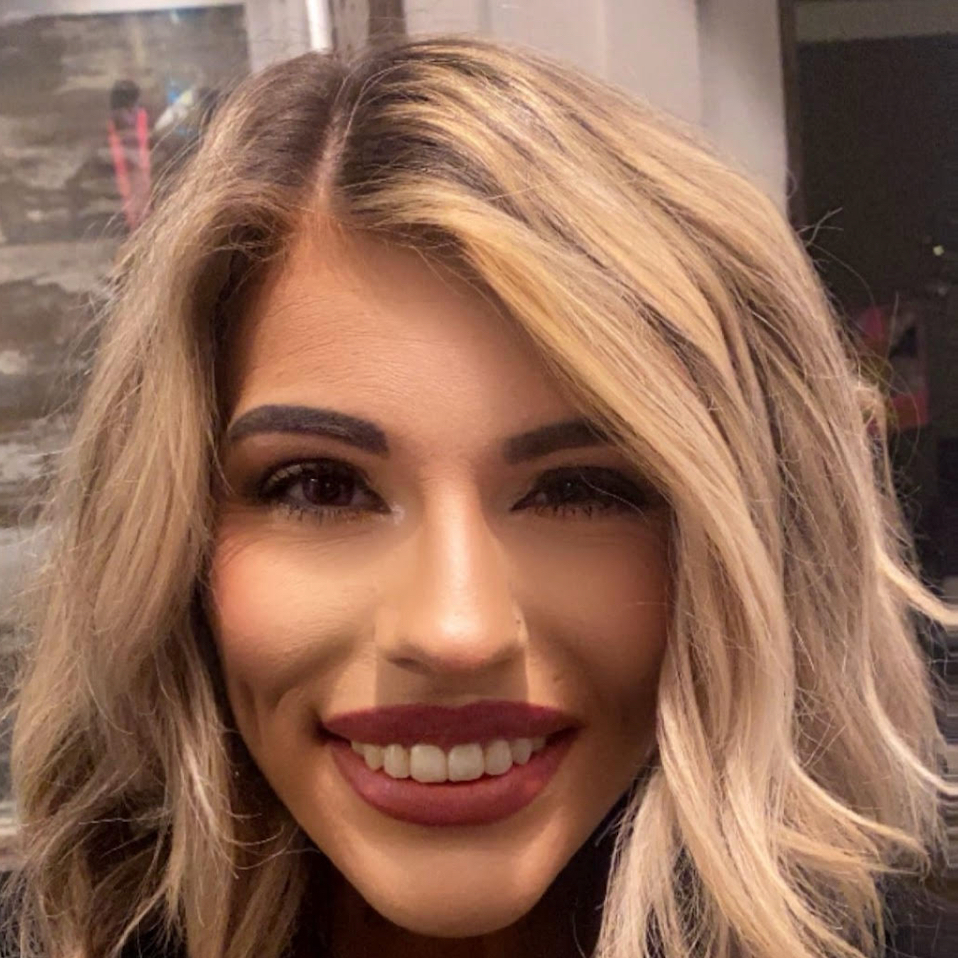Mental Health and Learning to Talk Again: Beth’s Stage 4 Tongue Cancer Story (Squamous Cell Carcinoma)
Beth opens up about her experience with stage 4 tongue cancer. She first noticed that something was off when fatigue, earaches, and a small ulcer on her tongue refused to clear up. After rounds of antibiotics and a scary migraine, an ENT finally spotted the problem and immediately called for a biopsy. Hearing the words “squamous cell carcinoma” was surreal. She remembers thinking, “What do I do now?” while her family processed the shock around her.
Interviewed by: Taylor Scheib
Edited by: Chris Sanchez
Beth explored treatment options and started chemo and radiation in April 2024. Radiation to her head and neck was brutal, stripping her of the ability to taste, eat, and speak comfortably. Even after months of treatment, her tongue cancer came back stronger. The recurrence led her to MD Anderson, where she faced the reality of losing 85% of her tongue. Surgery lasted 12 hours and required removing lymph nodes and rebuilding her mouth with muscle from her thigh. She then went through proton therapy, documenting her experience on social media to connect with others.
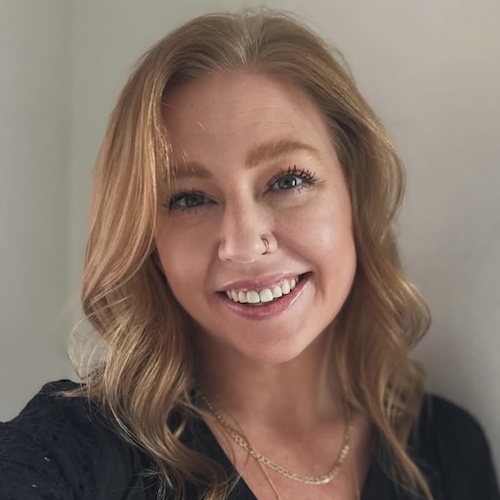
Life after squamous cell carcinoma treatment has been as complicated as being in treatment. Beth had to relearn how to eat, communicate, and see herself in a world centered around food and conversation. She speaks honestly about the mental health weight of survivorship and her struggles with fear, grief, and the pressure to feel “normal.” But she also embraces her new self with courage and humor, finding purpose in supporting other young women facing head and neck cancers.
Beth wants people to understand that survivorship is messy. It comes with gratitude and anger, and some feel a responsibility to live for those who didn’t make it. She encourages awareness of tongue cancer and head and neck cancers, especially in younger women whose rates are rising. Her story is a reminder that life after cancer is different, but it can still be meaningful, connected, and full of small joys, like nibbling a few bites of pasta on vacation or sharing her story online so someone else feels less alone.
Watch Beth’s video and read her transcript below. You’ll learn more about her inspiring story:
- How she learned to eat and talk again after losing most of her tongue
- The surprising early signs of tongue cancer you might overlook
- Why survivorship can be as emotionally heavy as treatment
- The social and mental health challenges of life after tongue cancer
- How Beth turned her diagnosis into advocacy for others
- Name: Beth R.
- Diagnosis:
- Tongue Cancer (Squamous Cell Carcinoma of the Tongue) with Perineural Invasion
- Age at Diagnosis:
- 34
- Staging:
- Stage 4
- Symptoms:
- Intense migraine
- Earaches
- Persistent tongue ulcer
- Treatments:
- Surgery: total glossectomy
- Chemotherapy
- Radiation therapy: proton therapy
This interview has been edited for clarity and length. This is not medical advice. Please consult with your healthcare provider to make informed treatment decisions.
The views and opinions expressed in this interview do not necessarily reflect those of The Patient Story.
- Hi. My name is Beth
- When I first noticed something was “off”
- The moment everything changed
- Exploring my treatment options
- The treatment path I took
- My symptoms came back
- Transferring my care to MD Anderson
- What my surgery looked like
- I had to do more treatment
- Losing most of my tongue impacts my everyday life
- Learning how to eat again
- How cancer changed me
- What I want people to know
Hi. My name is Beth
I had squamous cell carcinoma of the tongue. I was originally diagnosed on March 11, 2024. I had a recurrence on October 5th, 2024. I’ve been cancer-free for almost five months now.
When I first noticed something was “off”
Cancer snuck up on me, honestly. It’s interesting looking back because hindsight is 20/20.
I had a lot of very mild symptoms, things that I wouldn’t have suspected were signs of cancer. I had habits that weren’t out of the ordinary. I was very tired because I was living a fast-paced life. I started to get sick and had a hard time getting better. My immune system just didn’t seem to function the way it should. I had a small ulcer on my tongue, almost like a cold sore or a swollen taste bud. My dentist noticed it and said, “Keep an eye on it.” I mentioned it to my primary care physician at some point, but I just bounced back to the dentist on that.
Leading up to my diagnosis, I got a really bad earache, to the point that I couldn’t sit still; it felt like swimmer’s ear or something bad. I messaged my doctor through the portal, and he put me on antibiotics. They didn’t help. I went back to him, and he gave me another round of antibiotics. Then I got a migraine, and it was worse than anything I had ever experienced before.
I went back to my PCP and told him about the migraine and earache. “We need to figure this out,” I said. He thought I might have problems with my TMJ or temporomandibular joint, which connects the jawbone to the skull, because I was grinding my teeth, and that was causing tension.
He told me, “Let’s try the ear, nose, and throat specialist.” So I went to the ENT. I went by myself because I didn’t think anything was wrong. The ENT pulled my tongue out and stopped right in her tracks. I thought that was an interesting reaction. She said, “You need a biopsy, right now.” She pulled out what looked like a sub hole punch, put some lidocaine on the iffy part of my tongue, and punched a hole in the side of my tongue. I got blood all over my face. I told her, “You have to tell me what’s going on.” She was nervous and said, “I’m going to tell you that in my professional opinion, it looks like cancer. It could come back as an autoimmune disorder that I’m unfamiliar with, or some other thing like that. Let’s not jump to the worst-case scenario, but you need to be informed. I’m giving you my best advice.”
So I left there, and that’s probably the angriest I’ve been in the last two years. I returned the following Monday with my mom, my sister, and my fiancée. And they told us that I had squamous cell carcinoma.
The moment everything changed
The only thing I really remember about finding out that it was cancer is that she never said the word ‘cancer’ itself. She said ‘squamous cell carcinoma,’ which is, of course, cancer, but I wasn’t used to hearing that. They handed me a sheet of paper that explained what squamous cell carcinoma is. It was like a worksheet you would get in school that tells you you’re sick.
I thought my fiancée, my mom, and my sister had a more intense initial reaction than I did. It was like in the movies, where the sound cuts out, but there was a lot of murmuring and movement around the room. The only thing I remember is thinking, “What do I do now?” I haven’t thought about it in a long time.
At the time, I felt like I was going to get all the answers and the knowledge about cancer and find the answers to questions like, what do I do now, how do I fix it, what are my options, where do I go from here, and so on. And that’s not what happens. There’s so much waiting involved and there are so many options, doctors’ appointments, tests, and things like that before anything else happens.
Exploring my treatment options
So in that initial appointment, I did ask, “What happens now? I have tongue cancer, what do we do?”
At the time, the ENT said that I would have to have surgery to remove the tumor, after which I would hopefully have clear margins. And then, hopefully, that would be the end of it and I wouldn’t need any more treatment. But if the surgery wouldn’t have clear margins, I would then need to do radiation and chemotherapy. He added that the surgery would leave me with a permanent speech impediment, and it would likely be challenging for me to feed myself for the rest of my life. I said, “What are my other options?” He told me, “Some people opt to do chemo and then radiation instead of surgery.
Looking back at MyChart, the ENT said I declined surgery. I don’t feel that’s how the conversation went, though. I feel like I was presented information and my options were, end up with a speech impediment and be unable to eat and then still have to do chemo and radiation, or just do chemo and radiation. And for me, at the time, it seemed unnecessary to have part of my tongue cut out if I didn’t need that done.
The treatment path I took
I went down the road of radiation. I was diagnosed on March 11 and started chemo and radiation, blast radiation to my head and neck, on April 29.
Almost eight weeks after that, and after they punched a hole in the cancer, the cancer seemed to get mad. I had planned to work up until I started treatment, but that didn’t happen. I lasted about three and a half weeks before the pain got too intense within two months. By the time I started treatment, I was quite ready to get the cancer out of my body. I was in a lot of pain. I could barely eat or talk.
I did seven chemotherapy sessions. I also did radiation to my head and neck. I developed burns on the inside of my mouth, on my tongue, all over my cheeks, down my throat, into my chest cavity. By the third week, I had lost the ability to taste, and by the fourth week, I could no longer eat using my mouth.
Radiation to the head and neck is a form of cruel punishment. I know that it’s effective in treating cancer, but I wish that more head and neck patients understood how difficult it is to have the head and neck blasted with radiation.
I finished my final round of radiation on June 17, 2024. And we danced and everything. I had done it. I had defeated cancer. I had lost 45 pounds in just two months, couldn’t talk or eat, but the cancer was gone, so it was time to celebrate.
My symptoms came back
About two months later, I was so eager to get my life back that I went back to work part-time. I was forcing the narrative that I was better, even though I didn’t feel better.
As it turns out, my cancer was chemo-resistant.
Around my birthday, I started getting headaches. We went to Miami, and I’m really glad I went on that trip. Because it was the last time I had my tongue.
We had this huge, grand dinner and I had this new lease on life. But when I got back home from Miami, I started having headaches. I went to see my oncology team, and they said, “Well, there are plenty of side effects from radiation.” It was hard to respond to that, but I had a CT coming up.
I had an awesome weekend during which I hosted my best friend’s bachelorette party. I was feeling a little off, but I powered through. The last day of that weekend, I had a headache like I used to before I got diagnosed. I went downstairs into one of the guest rooms, put on my headache hat and shut the door, and screamed at the top of my lungs, blood in my ears. “This is not normal,” I said.
When we went home, I told my partner about it, and he took me to the emergency room. I told them my medical history and they said, “We’ll do a CT scan.” The ER doctor said that they couldn’t see anything, and I responded, “OK, but I’m still in pain even after the medication you gave me, so what now?” They admitted me overnight, and I ended up in the hospital for five days.
I didn’t think the cancer had already come back. I hadn’t even let that cross my mind. Of course it had, but I felt like one of the doctors would have seen it if so.
My oncologist sat me down and sat next to me. He said, “The cancer is still there or back.” I was like, “How is that possible? How could that happen? You didn’t tell me it cold happen.”
Cancer number two was worse. It was much larger, much further back, and much meaner than cancer number one. My medical oncologist isn’t at fault. They treated it, and while I was in treatment, the cancer leapt out of the treatment zone and started over.
The medical oncologist told me that they thought I should go to MD Anderson in Houston. I wish I had started there. I can’t go back, of course. I lost 85% of my tongue.
Transferring my care to MD Anderson
It took place over two or three weeks. So they did a PET scan, a CT scan, and I met with all the doctors and they said, “This could happen. We’ll all talk. Come back in three weeks and we’ll tell you, as a board, what we decide is the best way foward.”
I went back on October 28. I then met the surgeon, the radiation oncologist, and a speech pathologist. Every single one of them said that I had to lose my tongue; I had options and didn’t have to do this, but it was what they recommended.
It was such a weird day. It was right before Halloween. I went home from finding out that I was going to lose my tongue with a giant bag full of Halloween candy. I will say I will never forget that day, because on top of everything else, my fiancee proposed to me that night.
We were going through the candy and there was this little plastic spider ring. He said, “Will you marry me?” and put the little ring on my finger, and that’s how we got engaged. It was just the two of us.
I thought my life was over, that I would never get to tell my mom that I loved her, and that I would never go out to dinner with my husband, enjoy vacation, or be normal. And then my fiancee looked me in the eyes and said, “I want every version of you.”
I went home and scheduled surgery. And then the cancer tried to kill me for the next four weeks. Squamous cell is a rapidly growing cancer, an aggressive one. The specific location of mine and the type I had was wrapped around my cranial nerve, which is attached to the ears and brain. That’s why I was having the headaches; the cancer essentially got into my nerve and then tried to suffocate me. My family will never forget the sounds of my screams.
What my surgery looked like
By the time I went in for surgery, I was so ready for the cancer to be removed from my body. I didn’t care what they did.
I was very upset about losing my tongue when I found out I needed to, but by the time I lost my tongue, I had resigned myself to the fact that I needed to get rid of it. It was disease-filled and it was killing me. I think that because of that, I lost sight of all the things that I will lose. The emotional impact of that has taught me now that I’m in survivorship. I think my body and mind were protecting themselves by putting on those blinders.
My surgery was 12 hours long. They removed the top of my neck, 75 of my lymph nodes, and 85% of my tongue. And then they took out a 12-inch-long muscle from my thight and reconstructed a flap. But because I have no natural tongue from this point, the flap is sewn to the gums and anchored to the floor of my mouth. I have about 10% of my tongue left. The only movement it does is what the basic tongue pumps. But as far as my oral cavity, nothing in it moves.
I had to do more treatment
I went back for my follow-up, and they said that I had to do proton therapy.
I had been under the impression that I would only need to do radiation once, to my head and neck. But MD Anderson said that proton therapy would be necessary due to the pain I was in and because the cancer had metastasized to the lymph nodes.
I think I was actually more upset about proton therapy than about surgery, because I had already done radiation and I knew full well how brutal it was. Keep in mind that I had been in treatment since April 2024, and this was now January 2025. I was supposed to do three months of chemo and radiation to be cancer-free, and ten months later, I still wasn’t healthy.
I started doing TikTok before radiation and after surgery. So all of my proton therapy is documented, which is wild. I started filming myself.
I wanted to be done, I wanted it all to be over. I know that’s what we all want. When they said that I had to continue treatment, it just consumed me. It felt so long and so hard.
Losing most of my tongue impacts my everyday life
I had to relearn how to eat, talk, and live my life as a person with a disability, and I fit into a lot of boxes that I didn’t before.
Survivorship in some ways has been as complicated as being a patient. The mental load of being a survivor is really heavy. I felt very alone when I found out that I had head and neck cancer as a woman. Unfortunately, it turns out that the incidence of such cancers in young women specifically has damn near doubled in the last twenty years. It used to be mainly a cancer of men 60 years and older. Women aged 25 to 45 have become the largest demographic next to men over 60. They don’t know why.
That being said, I couldn’t find anyone exactly like me, a young woman with her whole life ahead of her. So I started with social media as a tool to track my own progress.
In general, some of the adjustments have been tough. Seeing what I look like when I talk. Controlling the movements of my face and mouth. All those things.
My number one thought is, hopefully, if one other person, some girl, comes across me on my little corner of the internet and feels like they can relate, I will have done more good than bad.
Learning how to eat again
We don’t always think about it this way, but food is at the center of our daily lives, as are communication, our voices, and the way we talk to people. Holidays, social interactions, birthdays — pretty much everything we do revolves around food, sometimes alcohol, talking, and being a person. And when we lose that, we don’t feel like we have a place in the world any longer. Especially coming from my background, where I literally fed people for a living.
I’ve lost a huge part of my identity. I’ve always been the loudest girl in the room. I’ve always been quick-witted, always liked telling jokes, always loved to cook a big meal and make cocktails and bring people together around those things. And then cancer came in and said, “Huh, just kidding.” And I also feel like it was hard on everyone in my life. No one, even those in my immediate family, knew how to help me.
I wanted so badly to eat again. My speech pathologist asked me, “Are you taking sips?” I was taking little sips, but I wanted to open my mouth again, and I didn’t know how to do that. My speech pathologist team at MD Anderson has been such a boon. I can’t say enough wonderful things about them. My plastic surgeon there, and everyone I’ve dealt with there, have quite literally changed my life. I’m indebted to them for giving me the chance to have the life I have now. They helped me take a no-nonsense approach to speech pathology. I wanted to do the hard things; if it’s hard, just tell me that it is.
I found out that the throat is one of the only muscles in the body that will completely forget how to do its job. So at the start, I was forcing a swallow with no tongue. So I would be sending food to the back of my throat in the hope that when it got there, my throat would know what to do. But as it turns out, it doesn’t, not all the time. Not to mention because they had to cut my neck open, and a lot of nerves and things are located there.
My feeding tube started to hurt, but it was sore, and I couldn’t deal with it anymore. But I was determined. And the first week or so was an adjustment, and I got stronger. I had been hungry before, and I didn’t want to be hungry anymore. All those efforts were strengthening my muscles, unbeknownst to me. And then one day, I think we were are the movie theater, and I couldn’t stand it. I shoved a French fry in my mouth and chewed it up, and took little drinks of water. It took me the rest of the movie to swallow it. But it turns out I can eat solid food.
It’s hard, it’s so hard. I put out a lot online that’s encouraging, but I would be lying if I said that I don’t still struggle.
The biggest thing for me with food is that I had to change my mindset around solid food. I don’t eat to fill myself up, with the expectation that I’m going to polish my plate. I didn’t have the opportunity to eat for almost a year of my life. Anything I get to put in my mouth is a bonus. I drink nutritional drinks four times a day. I’m well-fed. I feel strong and healthy because I know how important nutrition is. Now, in this instance, I might have some instant macaroni and cheese. It’s delicious, salty, and soft, and it’s a safe food for me; I know I can always have some. I can go on vacation with my family and order the kids pasta and have a few bites of noodles, and get to share that moment with them. And that’s enough.
How cancer changed me
I have a lot of fear. I was afraid of almost everything coming out of treatment. I didn’t know how to be social; I didn’t know how to talk to people like the guy at the gas station. I hated opening my mouth and watching people’s eyes and seeing them go, “What did she say?” I hated having to repeat myself.
I refused to go to the grocery for several months, because I could not stand to be reminded of all the things I can’t do. And I keep putting this invisible pressure on myself from everyone else.
But I could just honor my body. I could stop being so mean to the girl who almost died, and start taking care of her.
And all I’ve ever wanted is to have a little bit of what I had before. My life will never be the same. I’m not the person that I was. Because I found out I had cancer. And now I realize that this person I am now is actually really cool and super brave. I started that little initiative online, and then a whole bunch of other people were like, “Hey, me too.”
I want to take what happened to me and use it to help make things better in the world. All I want is to make someone else feel a little bit less alone and a little bit less scared.
What I want people to know
Survivorship is a lot of feeling bad that other people have died and that I’m alive. It’s anger about what happened to me. But I’m glad that I’m here. My heart is going to be broken forever, but I’m happy I have this new outlook on life. Sometimes I’m here and sometimes I’m there; sometimes both at the same time.
I went into the treatment room thinking I would never tell anyone anything ever again. They told me they had no idea what I would sound like. And I can’t imagine being trapped inside my body. That was the biggest fear.
Not everyone gets a second chance. And not everyone gets to open their eyes for the first time. Cancer was the worst thing that ever happened to me, but it feels like getting a second chance. And the bonus round is really sweet.

Inspired by Beth's story?
Share your story, too!
More Head and Neck Cancer Stories
Vikki F., Head and Neck Cancer (Nasal Squamous Cell Carcinoma)
Symptoms: Nosebleeds that persisted for years, nose changed in shape, nasal pain, migraines
Treatments: Surgeries (subtotal rhinectomy, reconstruction surgery including radial forearm free flap, bone grafts, and cartilage), chemoradiation
...
Alyssa N., Adenoid Cystic Carcinoma
Symptoms: Persistent jaw pain, lightning-like facial pain during the first bite of meals
Treatments: Surgery (tumor removal), radiation
...
Eva G., Oral Cancer, Stage 4
Symptoms: Sore on the tongue, which caused pain during eating and speaking; changes in the color and texture of the tissue where the sore was located
Treatments: Surgery (partial glossectomy, radical neck dissection, reconstruction), radiation
...
Teresa B., Recurrent Breast Cancer (Hormone-Positive), Oral Cancer (Lip Cancer), and Skin Cancer (Melanoma)
Symptoms: Lip cancer: chapped lips & a pimple-like growth on lip, breast cancer: enlarged left breast with lump, melanoma: none
Treatments: Surgeries (bilateral mastectomy with reconstruction, lumpectomy, craniotomy, Mohs, surgery, wide local excision), hormone therapy, radiation therapy
...
Kandi B., Adenoid Cystic Carcinoma, Stage 3
Symptoms: Fatigue, headaches, depression, occasional feeling of tongue being on fire or inflamed, appearance of tumor on salivary gland on tongue
Treatment: Surgery
...
